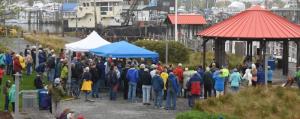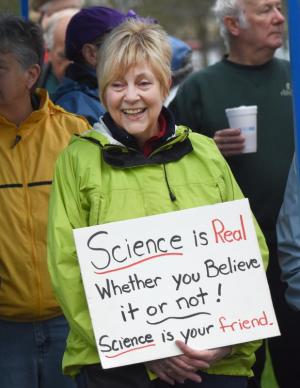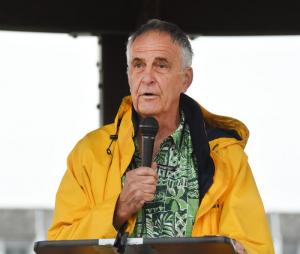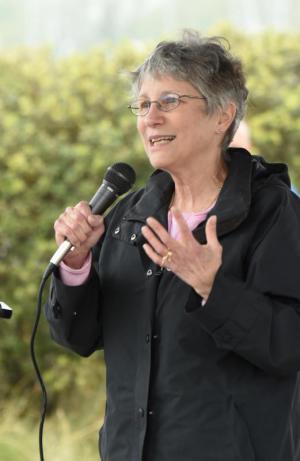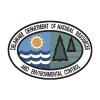Lewes Mayor Ted Becker said it was interesting that the March for Science was being held in Canalfront Park April 22. Once on the verge of development, the space was preserved and now serves as open space that absorbs flood waters during strong coastal storms.
Without it, properties along the Lewes-Rehoboth Canal may have fallen victim to higher flood waters as seas continue to rise around the world, he said.
Science played an important role in the decision making for Canalfront Park, he said, and it should be at the forefront for all decision makers around the world.
Lewes is fortunate to have the University of Delaware’s College of Earth, Ocean and Environment at the end of Pilottown Road, he said, and the work of scientists and researchers every day plays an important role in understanding, addressing and responding to climate change.
“This work does not just happen,” he said. “It takes the support of government at every level for this work to go on.”
About 200 people turned up for Lewes’ March for Science, one of more than 100 gatherings around the world. An estimated 40,000 people marched in both Washington, D.C., and Chicago, with thousands more in many other major cities.
The purpose of the march was to stress the importance of science in today’s society.
“Science, scientists and evidence-based policy making are under attack,” said Jonathan Sharp, a former UD professor and organizer of the Lewes event. “Budget cuts, censorship of researchers, disappearing data sets and threats to dismantle government agencies harm us all, putting our health, food, air, water, climate and jobs at risk.”
The march was inspired by budget cuts in President Donald Trump’s proposed budget, but Sharp said the issues are much larger than that. He said there is a general disinterest and disrespect for science by the U.S. public that has been festering for several decades.
“I urge all of you to stay interested, be informed and be involved,” he said. “One of the greatest threats to American democracy is an apathetic, uninformed public. This is a greater threat today than I think any time in the 70-plus years I’ve been on this Earth.”
Many of the science supporters brought homemade signs. One read “Science is not an alternative fact,” while another said, “Think like a proton, stay positive! Truth and science matter.”
Lewes’ march featured six speakers, each with a unique perspective on science and its impact on today’s world.
Michael Krause, research professor emeritus of philosophy at Bryn Mawr College and author of six books, said science is one of the greatest achievements humankind has devised.
“Without science, we could not adequately describe and improve upon the basic things that matter to us most,” he said.
He urged those in attendance to fight for science.
“Let us seek sound evidence and arguments,” he said. “Let us encourage vigorous yet unbiased debate. Let us remain modest in the face of human fallibility. Let us not suppress relevant evidence. Let us not cite bogus authorities. Let us avoid obfuscation and dogma. Let us foster and support an open society and institutions that promote free and open inquiry.”
Climate March set April 29
On the heels of the March for Science, thousands more people are expected to march on Washington Saturday, April 29, for the Peoples Climate Movement’s march for climate, jobs and justice. A local bus will leave from St. Peter’s Church Saturday morning. Two seats remain. Interested folks may call Trish Baines at 302-644-2356. The Peoples Climate Movement is a project of more than 50 organizations working together to solve what they call the climate crisis, and address growing pollution of air and water, while also assuring the creation of good jobs in the community. As with the March for Science, there will be several satellite marches around the world.
Nick Roth is the news editor. He has been with the Cape Gazette since 2012, previously covering town beats in Milton and Lewes. In addition to serving on the editorial board and handling page layout, Nick is responsible for the weekly Delaware History in Photographs feature and enjoys writing stories about the Cape Region’s history. Prior to the Cape Gazette, Nick worked for the Delmarva Media Group, including the Delaware Wave, Delaware Coast Press and Salisbury Daily Times. He also contributed to The News Journal. Originally from Boyertown, Pa., Nick attended Shippensburg University in central Pennsylvania, graduating in 2007 with a bachelor’s degree in journalism. He’s won several MDDC awards during his career for both writing and photography. In his free time, he enjoys golfing, going to the beach with his family and cheering for Philadelphia sports teams.



















